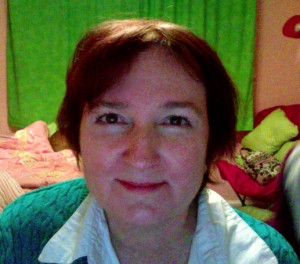“My Voice” by Christine LeGrant

Christine LeGrant - 'Survivor'
Years ago, I attended a rally for patients’ rights. Among the demonstrators I saw groups of cancer survivors carrying signs and chanting, some with their surgical scars showing. I had worked for many years as an oncology nurse and was, at the time, a physician assistant working in an HIV/AIDS clinic. I knew many people who were fiercely private about their illnesses, and others who were, like these activists, very, very public. I imagined if I were in their place I would be among the former. Although drawn to activism, I’m an introvert by nature and it seemed at the time that something as deeply personal as a life and death struggle would be just too difficult for me to live out so publicly. I thought about that, but I didn’t dwell on it. Life went on.
In March of 2006 everything changed. At age 51 I went in for my first screening colonoscopy. I’d had symptoms of irritable bowel syndrome for most of my adult life, but those symptoms were so typical there seemed to be no cause for alarm. In fact, my IBS symptoms had been improving over the past year or so. There was some history of colon cancer among my aunts and uncles, but none in my immediate family, so there were no big worries there. I went in thinking everything would be fine. When I woke up, my doctor was telling me he’d found a mass. He didn’t have to say any more. I knew what that meant. I knew what I saw when he showed me the picture. I had cancer. It was Stage III colon cancer, and a complete surprise.
During the next weeks and months, I began to realize that far too many people were unaware of colorectal cancer screening and of its lifesaving potential. I began to understand how my story could help others see how a colonoscopy really could make the difference between life and death. People needed to hear how someone with no new symptoms could have an advanced cancer. People needed to hear how this cancer could be detected and successfully treated. They needed to see someone with colorectal cancer survive and thrive. I needed to tell my story.
And so I became one of the people who lived my struggle in a public forum. I told my story to everyone who would listen, in person and on the internet. I talked to people who had very little information about CRC, risk factors, and screenings. Many thought you only needed screening if you had a family history. Some women thought only men needed screening. Several people told me later they got screened for the first time after they heard my story. That’s what I was after.
In my search for more ways to spread the word, I discovered C3: the Colorectal Cancer Coalition, which opened up new opportunities for involvement. I’ve participated in three Call on Congress events in which survivors and other advocates meet with elected officials and staff to discuss the need for policy change and funding for colorectal cancer. Policy advocacy for colorectal cancer is much needed work. Awareness is a good start, but action has to follow. There’s always more to be done.
I firmly believe that no survivor is under any obligation to set an example, inspire anyone, or to save anyone other than him or her self. I just happened to make a different decision than the one I thought I’d make all those years ago. Survivorship, for me, and I speak only for myself, means continuing to fight cancer even after my cancer is gone.


